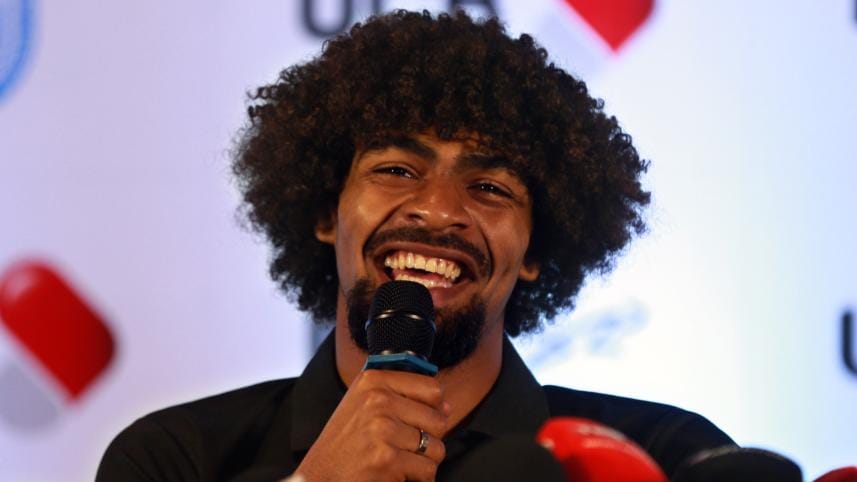Can Hamza bring back the golden days of Bangladesh football?

Most people these days will not believe me when I tell them that there was once a time when us Bangladeshis had very strong emotions related to football and our footballers. We did not have English hooligans, but each and every locality was somewhat divided between an epic rivalry of Mohammedan versus Abahani.
Whenever these two teams met, there were festivities all around. The two teams' clearly distinguishable flags would get hoisted here, there and everywhere—the white against blue somewhat gave us a glimpse into a future where these two flags would get replaced by the Argentinian and Brazilian flags.
Yes, it is a pity that our footballing heroes got slowly replaced by the likes of Shakib Al Hasan, Tamim Iqbal, Mashrafe Bin Mortaza, and at a certain point, when Bangladesh managed to enter the highest echelon of cricketing competitions, the beautiful game really had to be sidelined.
That injury caused by cricket was so massive that it managed to send our brand of football to the ICU for over two decades. But that situation is changing—or at least there are signs—thanks to one man—Hamza Choudhury.
Let us rewind to the nineties once again. While the FIFA World Cup broadcasts on BTV gave us glimpses of stars like Diego Maradona, Romario, Careca, Roberto Baggio and George Hagi, we had our own heroes in the form of Kaiser Hamid, Shiekh Mohammad Aslam, Imtiaz Ahmed Nakib, Sayeed Hassan Kanon, Mohamed Mohsin, Jewel Rana, Masud Rana, Monem Munna and many others.
During those exciting times, for every youth of my age, going to Dhaka Stadium to watch a first division football league match was an essential part of growing up, or in other words, it was a coming of age ritual for most of us, if not all.
I vividly remember being taken to the Dhaka Stadium by my father and his youngest brother to see the game between Mohammed Sporting Club and Arambagh Krira Chakra.
Being raised in a protected environment and a middle class family where decency and showing respect towards others were lessons taught to us from the very moment we were born—even as an infant, crying too loud was considered 'rude' — visiting the stadium was an eye (as well ear) opener.
When the referee called offside on a goal scored by a Mohammedan attacking midfielder named Roxy, there was a clearly audible uproar from the entire 'so called' Mohammedan gallery.
My dad and uncle were a bit unsure whether we had ventured in to the 'right gallery', as at that time, the Dhaka Stadium was clearly divided between Abahani and Mohammedan, and during that match, Abahani supporters were supporting Arambagh.
But then, a supporter cleared all doubts. He stood up tall, pointed towards the referee, and said, "That man, you know, the referee, over there—he is my father in law".
I was surprised to hear that. For a kid who still did not venture into his teens, that statement raised significant amount of curiosity. But that was just momentary. The diehard supporter started giving a detailed description of what he wanted to do with the poor referee's daughter—and in graphic details—details that my young ears were not ready to accept! My uncle tried to shield my ears; asked me to ignore. People around me seemed astonished, too. But then we all burst into laughter, and that make believe son in law of the ref, too.
Throughout the 90 minutes, and a few more thrown in here and there, not a moment seemed boring. When the on field action was dry, there were feriwalas selling stadium specific delicacies like jhaaltes, jhalmuri, chanachur, vhelpuri, soft drinks and bottled water to keep us entertained.
Just like most other matches between unevenly matched opponents back then, soon enough Mohammedan strikers overcame odds like poor refereeing and compact defensive efforts by the opponent, and goals started pouring in. There were no Mexican waves, but the jubilation was not too different from what we see during a Bangladeshi cricket match these days.
After the match was over, we had to take a long walk to get out of the stadium. The narrow exists were really crowded, and the inevitable occurred. My father's wristwatch was snatched. He was furious, and clearly, very upset. His younger brother was trying to console him.
I do not remember this too clearly, but apparently, I made the most infuriating statement at that time. I asked dad to forgive the thief, because "thieves also need to do something to earn their living", and once again, waves of laughter erupted around us, and even my enraged dad had to let go of his anger.
During those times, even games against minnows garnered a sizeable crowd. But then cricket happened, and we lost all our heroes.
For a long while, we did not see any light of hope. Jamal Bhuiyan brought back some of the limelight, but that was not enough.
Yes, he may not be our 'Messi', but he can easily become our Pablo Aimar or Esteban Cambiasso. I strongly believe it. Let us keep our fingers crossed and eyes glued to the screens on March 25—when Bangladesh will play against their archrivals on paper, India. Maybe this time this rivalry will stop being something we only hold in our minds, and will be translated to reality.



 For all latest news, follow The Daily Star's Google News channel.
For all latest news, follow The Daily Star's Google News channel.
Comments